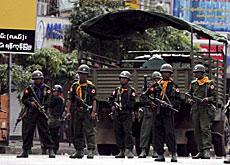Expert says China holds key to Myanmar crisis

As the crackdown gathers pace in Myanmar, relations within the military regime and China's role will determine whether things gets out of hand, says a Swiss expert.
For its part, the Swiss foreign ministry has advised its citizens against travelling to the southeast Asian country, where troops and riot police are battling to put an end to ten consecutive days of protests.
The crackdown has led to international condemnation of the military regime and further demonstrations are planned at embassies across southeast Asia.
On Friday security forces sealed off the five main Buddhist monasteries in Yangon. At least nine people were killed in clashes on Thursday between security forces and demonstrators, led by monks.
Western ambassadors said the actual death toll could be far higher, and hundreds of protesters were arrested over the past few days.
The United States tightened sanctions against Myanmar and the European Union is considering similar steps.
But Matthias Huber of the Association Switzerland-Burma is sceptical they will have much of an impact. He says the role of China, Myanmar’s largest trading partner, is key to a resolution of the conflict.
swissinfo: What are the chances that the protests against the military regime will be successful?
Matthias Huber: Everything depends on China and whether the Myanmar generals are willing to listen. The protesters themselves can’t beat the army, and they don’t want a violent confrontation.
swissinfo: How far is the military regime likely to go?
M.H.: We don’t really know about the workings inside the armed forces. There is one group that is not prepared to make any concessions and is ready to crush the protest with sheer force. The other appears to be more willing to negotiate.
And then there are also those opportunists who will rally behind the stronger ones.
There is also a potential power struggle between the old generation of generals, led by Than Shwe, and younger military leaders.
Very little is known about the regime. They were trained in a closed-off system and none of them studied at military academies abroad.
swissinfo: How likely is a repeat of the 1988 events, when pro-democracy protests ended in a bloodbath?
M.H.: I think there is a great risk, especially if the hardliners have their way. The troops have no experience of riot control and their instinct is therefore to fire at the demonstrators, as they have been instructed to do.
Furthermore, there are people paid by the regime to try and escalate the protests, like in 1988, and they are hiding among the monks.
swissinfo: China, the key player in the region, called for restraint at a meeting of the United Nations Security Council. But what will it take for Beijing to get involved?
M.H.: A stable situation is very much in China’s interest, for different reasons, notably next year’s Olympic Games.
Beijing is keen to see the Olympics pass off without incident to maintain its image towards the Western world.
Economic sanctions are not the only measure the West has to put pressure on Myanmar. Neither the US nor the EU have substantive business ties with Myanmar. A boycott is more symbolic than anything.
But the West could threaten to boycott the Beijing Olympics. This would be much more convincing in my view.
swissinfo: Can the pro-democracy leader and Nobel Peace Prize winner Aung San Suu Kyi do anything?
M.H.: She has been kept under house arrest, which is reassuring.
Some members of the military regime at least seem to be aware that it is the last moment to negotiate with her. Which means she will stay alive.
swissinfo-interview: Carole Wälti
Myanmar, formerly Burma, has been under military rule of one form or another since 1962.
Its economy has collapsed and dozens of ethnic militias have waged civil war against the Burmese-dominated central government.
The UN says the junta has more than 1,100 political prisoners under lock and key.
Nobel peace laureate and opposition leader Aung San Suu Kyi has been under house arrest for 11 of the past 17 years.
ICRC staff have not visited her since September 2003.
The Swiss foreign ministry is advising citizens not to travel to Myanmar in the current situation.
In an update of its website on Thursday it said it was difficult to foresee how the situation will develop.
The ministry previously called on Swiss citizens to stay away from street protests against the military rulers.
There are currently about 50 Swiss residents in Myanmar and the foreign ministry said it is in contact with the Swiss community.

In compliance with the JTI standards
More: SWI swissinfo.ch certified by the Journalism Trust Initiative











You can find an overview of ongoing debates with our journalists here . Please join us!
If you want to start a conversation about a topic raised in this article or want to report factual errors, email us at english@swissinfo.ch.